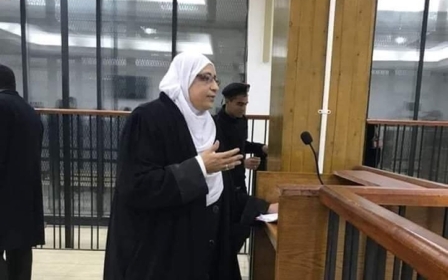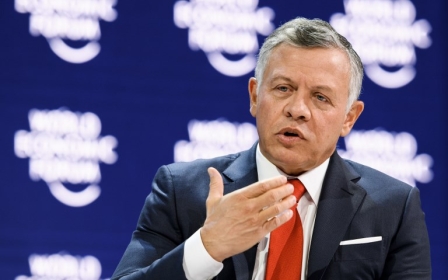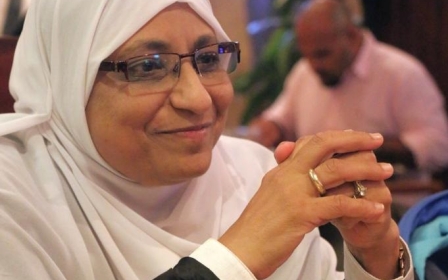Rights activists appear in Egyptian custody weeks after their disappearance
Prominent Egyptian human rights lawyer Hoda Abdelmonem, whose whereabouts have not been known for 21 days since police raided her home, appeared at Cairo’s National Security Prosecution headquarters on Wednesday, her family told Middle East Eye.
Abdelmonen, 60, was taken from her home to an undisclosed location in the early hours of 1 November by security forces that had turned her flat upside down, in what rights groups have described as unlawful "enforced disappearance".
She was one of at least 19 activists and human rights defenders targeted by authorities that day, according to Amnesty International.
Abdelmonen's daughter, Gehad Khaled, confirmed to MEE that lawyers saw Abdelmonem and several other female activists at the headquarters of the National Security Prosecution in Cairo on Wednesday, but that no charges have been brought against them yet.
Those who appeared alongside her include charity worker Somaya Nassef, who was arrested on the same day as Abdelmonem.
The lawyers who spoke to Khaled did not confirm the names of other activists who appeared. They may either be released or face charges, the lawyers told Abdelmonen's family.
At least 40 other rights workers, activists and lawyers have been rounded up since late October and held incommunicado by Egyptian security forces, according to Human Rights Watch.
A leading role
Abdelmonem had a leading role in the 2011 revolution that ousted longtime autocrat Hosni Mubarak. Once a member of the National Council on Human Rights, she quit the state institution after President Abdel Fattah el-Sisi took power in 2013.
Abdelmonem had been providing legal assistance to families of people who have been victims of enforced disappearance in Egypt.
As part of her efforts to document cases of those forcibly disappeared, Abdelmonem has volunteered as a consultant for the Egyptian Coordination for Rights and Freedoms (ECRF), a prominent human rights organisation that has been hard hit in the latest crackdown.
She was one of at least nine women arrested during the 1 November raids, according to Amnesty.
The officers did not present any arrest warrants, but they confirmed that they belonged to the National Security Agency, Abdelmonem's family told MEE.
With Egyptian authorities denying knowledge of her whereabouts, Amnesty classified Abdelmonem as "forcibly disappeared".
“Amnesty International believes that Hoda’s activism, as well as being a member of the defence team in several human rights cases, are the reasons behind her arrest,” the international rights group said on 2 November in the wake of her disappearance.
Concern for her health
Abdelmonem’s family has expressed great concern over her health, especially as she had recently been diagnosed with deep vein thrombosis - a blood clot in a vein in her leg impacting her movement and requiring regular medication.
Fadwa Khaled, Abdelmonem’s eldest daughter, was the only other person at the lawyer's home in the Egyptian capital when she was arrested.
They blindfolded her and refused to let her take any of her belongings or medication
- Fadwa Khaled, Abdelmonem’s eldest daughter
“She was sleeping, but I was awake when, at 1.30am, the door of our flat was broken, and nearly 20 officers stormed the flat,” Khaled told MEE.
“They blindfolded her and refused to let her take any of her belongings or medication,” she said.
The recent round of arrests is part of a crackdown on rights defenders and dissent led by Sisi, a general-turned-president who came to power after leading a military coup against his predecessor, Mohamed Morsi.
Rights groups have documented at least 60,000 political prisoners since Sisi assumed office in 2014, in a crackdown that Human Rights Watch has described as "the worst human rights crisis in the country in decades".
New MEE newsletter: Jerusalem Dispatch
Sign up to get the latest insights and analysis on Israel-Palestine, alongside Turkey Unpacked and other MEE newsletters
Middle East Eye delivers independent and unrivalled coverage and analysis of the Middle East, North Africa and beyond. To learn more about republishing this content and the associated fees, please fill out this form. More about MEE can be found here.




